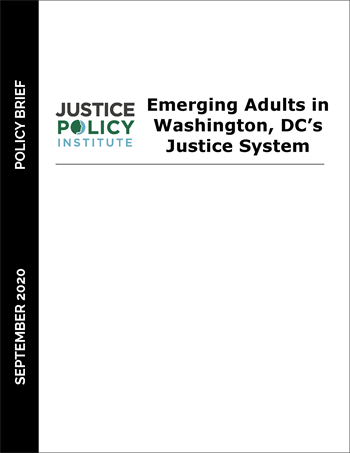Traditionally, criminal justice system involved young, or emerging, adults age 18-25 have been treated in the same ways as older adults. In recent years, jurisdictions around the country have been exploring new approaches to the treatment and care of emerging adults. This movement has been galvanized by research showing that brain development continues into the mid-20s, and developmental milestones associated with independence and maturity continue well past the 18th birthday. The efforts have also been driven by the reality that we do a very poor job meeting the needs of this group of young people, who are disproportionately Black and Brown, with awful outcomes as a result.
Black emerging adults, a fraction of the District’s population (5.5 percent), account for the overwhelming majority of people experiencing justice system involvement. Despite being only 1 in 18 District residents, Black emerging adults account for 1 in 5 arrests, 1 in 4 arrests for a violent crime, and 1 in 3 individuals incarcerated. The District is also plagued with extraordinarily high rates of racial disparities among emerging adults serving long prison terms. Over 95 percent of District residents in prison, and nearly 98 percent of District residents in prison serving the longest prison terms who were sentenced as emerging adults, are Black.
This degree of disproportionate justice system involvement underscores how evidence-based, developmentally appropriate interventions targeting emerging adults can have an outsized positive impact on public safety. In the era of Black Lives Matter, we must believe they matter at all stages of life and in all circumstances. Our treatment of emerging adults in the justice system must change if we are to fulfill that vision.
Fortunately, the movement to create approaches specifically designed for this population is growing quickly. Reforms include new developmentally-tailored approaches to community supervision and community-based resources, institutional care and court processes which will result in improved public safety outcomes as well as enhanced safety in facilities for incarcerated young people and staff.
This is also a critical moment for justice reform in Washington, DC. Fifteen years ago, the District embarked on major reforms to its juvenile justice system, relying much less on incarceration in response to youth crime, instead tailoring responses to that are developmentally appropriate and based on research. DC is one of several jurisdictions pursuing reforms for emerging adults, and is becoming a national leader in this movement by establishing the Young Men Emerging Unit (YME) in the DC Jail.
The papers were issued as stakeholders in the District are coming together to complete development of a strategic plan for better serving emerging adults in DC’s justice system as required under the amended Youth Rehabilitation Act of 2018, with support from the Public Welfare Foundation.
Emerging Adults in Washington, DC’s Justice System
